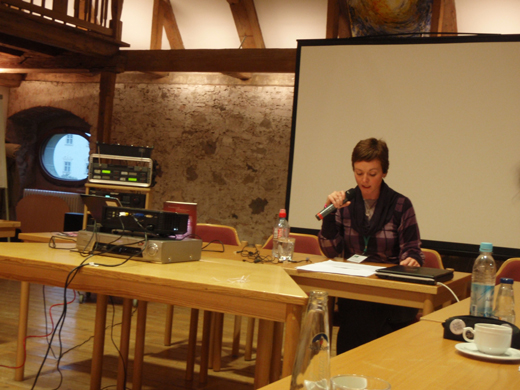
|
image copyright © Matt Kenyon |
|
Postcolonizing Europe? An International Workshop // May 10-12, 2010
Sabrina Marchetti (Utrecht) - Gender, migration and postcoloniality: Narratives of Eritrean domestic workers in Rome
Postcoloniality is today acknowledged as an important lens for the analysis of the lives and narratives of migrant subjects who are affected by it not only at the level of material social positioning but also at the level of (self)representation and identity formation (Ahmed 2000, Balibar 2004). At the same time, the standpoint of migrant women, domestic workers in particular, is widely considered as a powerful perspective on the 'inequalities' affecting contemporary societies in an era characterised by the feminisation of migration and the increasing globalisation of care work (Ehrenreich and Hochschild 2002).
In my presentation I am going to combine both perspectives, looking at the case of Eritrean women who arrived in the city of Rome before 1980, worked as domestics for wealthy families, and, in some cases, still do. In the working experience of the Eritrean women I have interviewed, one can see the connection between the postcolonial migrants' process of subjectification and the inevitable distinction between subjects occupying different social positions in Italian society. This is a social space which has been constituted through an history of representations that determines each person’s position along the axes of class, gender, and ethnicity. I will show how colonial discourse nurturs those representations and the material life conditions which are related to them.
In order to understand the importance of the interviewees' life narratives, I will make use of the concept of 'feminine cultural capital' (Skeggs 1997) which I apply to the process of ‘colonial acculturation' whereas dominated subjects learn specific cultural practices and the social hierarchies attached to them. This concept illuminates the importance of pre-migratory time as the moment in which Eritreans acquire the cultural and social knowledge that will later determine their taking-up of specific social positions as postcolonial migrants in Italy. Secondly, I will look at the interviewees' narratives as conveying several tactics of resistance (De Certeau 1984) to the surviving colonial legacies in contemporary Italian society. Thus, with reference to the categories of gender and ethnicity as they are articulated in the realm of postcoloniality, my analysis will elaborate on the narrative 'tactics' performed by the interviewees and through which they negotiate their segregated labour position in Italy. This approach will be applied to the narrative analysis of 15 in-depth interviews collected in Rome between 2007 and 2008 within my PhD research project.
In my contribution, postcoloniality will emerge as a relationship which is characterised by an intrinsic 'ambivalence'. In fact, I contend that representations attached to postcolonial migrant women may lead to opposite endings: they may ease their ways into the former colonisers' society but, at the same time, they may relegate them to the lowest strata of society. The interviewees have lived a life on the edge of this ambivalence, where being Eritreans has been simultaneously their tool of resistance, and the reason for their subordination. Yet I will suggest that in some respects, the interviewees were able to challenge, manipulate and finally adjust to their wishes this ongoing process of postcolonial subjectification, resulting in a more complex relationship than a clear cut dichotomy between coloniser as dominator and colonised as victims.
In conclusion, my presentation wants to contribute to the debate on the representation of different personal and historical events that postcolonial subjects develop within the context of migration and global care distribution. It is in this perspective that I will elaborate on postcoloniality as a double sided material and symbolic relationship between formerly colonized and coloniser people, which oscillates between a positive recognition and a strangling tie.

READ MORE ABOUT THE EVENT


